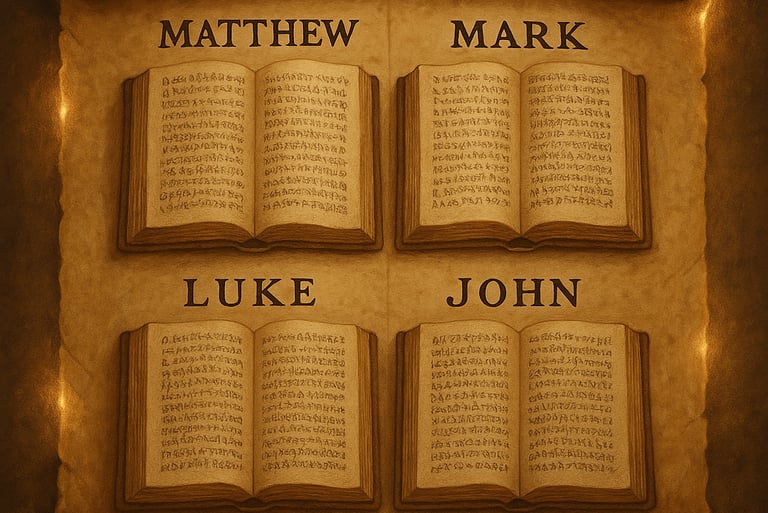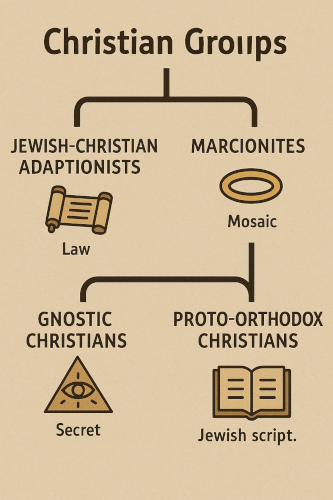🕊️ A Fresh Look at the New Testament
Alan Dyer
May 7, 2025
The New Testament
Structure, Composition, and Beliefs
Exploring the origins of Christianity through a different lens
Many Christians assume the New Testament presents a single, unified message. But what if it’s more like a conversation, a dynamic and sometimes conflicting chorus of voices? From Jesus’ teachings of love and humility to Paul’s bold theology of salvation through faith, the New Testament reflects a movement still discovering what it believed.
The New Testament is a collection of 27 different texts combined into one. These texts were written by a diverse combination of people who based their writings from Christian oral traditions. They were composed between 50 CE and 120 CE in ancient Greek and then retranslated into Hebrew, Latin, Coptic, Syriac, Ethiopic, Armenian, and Georgian. The New Testament was translated into Latin Vulgate by Eusebius Hieronymus, St. Jerome in 405 AD and from there translated into Middle English by Wycliffe in 1380.
In the New Testament we find four main types of writings:
The Gospels: (Matthew, Mark, Luke, and John): These are the biographies of Jesus. They cover his birth, teachings, miracles, death and resurrection. These are theological narratives of his life and purpose.
Acts of the Apostles: This is the sequel to the Gospels. It tracks the growth of the early Christian community and the missionary journeys of Paul and others.
The Epistles (or Letters): These are primarily attributed to Paul although Paul did not write them all and what he did write was changed. They offer guidance, correction, and theology to early Christian communities.
Revelation is a symbolic, apocalyptic vision of the end times and ultimate justice when the Son of Man comes holding the keys to death and Hell with the authority to execute judgment upon the living and the dead.
Each of these writings are different. Authors with different agendas, backgrounds, and audiences wrote them. It's like opening a group chat where everyone has their own opinion on who Jesus was and his message. This diverse and sometimes conflicting set of writings shows us that early Christianity was anything but uniform. It was many different things.
Timeline and Authorship
The earliest writings in the New Testament weren't the Gospels. They were Paul's letters. Most scholars agree that 1 Thessalonians was likely the first to be written, around 50 CE. The Gospels came later. Mark likely first, then Matthew and Luke, and finally John. Revelation was written last.
Authorship is another interesting aspect. While names like "Matthew" and "John" are attached to the Gospels, there's no solid evidence that those men wrote them. Most of these books were anonymous when first circulated, the authors unknown.
We have a theological patchwork quilt stitched together by different voices, each shaping the evolving image of Jesus and early Christian belief. The New Testament reflects a community figuring itself out in real-time, with all the messiness and intensity that entails.
📘 How the New Testament Was Chosen
Early Christians had dozens of texts floating around, some that claimed to be written by disciples like Thomas, Mary Magdalene, or Peter. The group that gained the most power, the Proto-Orthodox, forerunner to the Catholic Church, decided what was “inspired” and what was “heretical.” They favored books that agreed with their theology and Paul’s teachings and slowly filtered out the rest.
By 367 CE, a bishop named Athanasius sent out a letter listing the 27 books we now call the New Testament. That list eventually stuck. By the time the Bible was “finished,” most alternative voices had been erased, banned, or buried in the desert, literally. That’s why modern discoveries like the Nag Hammadi Library (found in Egypt in 1945) were so groundbreaking.
Suddenly, we had access to texts that early Christians also cherished like the Gospel of Thomas, which has Jesus’ sayings without any miracles or death scenes. Understanding how the New Testament was formed helps us see why Paul became so dominant, and how the teachings of Jesus were reframed by his followers.
Beginnings of Christianity
Christianity during the time of Jesus, was not yet a structured religion but rather a movement centered around his teachings. It was deeply rooted in Jewish traditions, as Jesus and his earliest followers were Jewish. His message focused on love, forgiveness, humility, and the coming of the Kingdom of God, drawing followers from diverse backgrounds, fishermen, tax collectors, and societal outcasts such as prostitutes, tax collectors, thieves, and lepers.
Early Christian Communities
The earliest Christian communities were small, often meeting in private homes for fellowship, prayer, and the breaking of bread. These gatherings were informal and built around mutual support. The Book of Acts describes how early believers shared their possessions and lived communally to care for one another.
Differences and Tensions
There were differences among early followers, particularly regarding the relationship between Jewish laws and the new faith. Some believed Jesus' message was for Jews alone, while others, like Paul, argued that Gentiles (non-Jews) could also join without adhering to Jewish customs like circumcision and dietary laws. This debate eventually shaped the direction of Christianity, leading to its expansion beyond Judea.
Some early groups believed Jesus was just a wise, spirit-filled teacher. Others thought he was a fully divine being who only appeared human (called Docetism). Jewish followers of Jesus insisted on keeping the Law of Moses, including circumcision and dietary restrictions. Meanwhile, others felt Jesus had liberated them from the Law entirely.
It is important to understand the conflict of early Christian beliefs. The disagreements weren't just theological but emotional, political, and personal. They shaped communities, caused splits, and led to excommunications within the Proto-Orthodox Church, later becoming the Catholic Church. The early Christian world constituted of many different teachings, passionate preachers, and contradictory beliefs.
What Did It Look Like?
A small, decentralized movement: No official church buildings—gatherings were held in homes.
Strong sense of unity and sharing: Followers saw themselves as a family, supporting one another spiritually and materially.
Conflicts with religious and political authorities: Jesus himself was seen as a threat by Jewish leaders and the Roman authorities, leading to his crucifixion.
📚Competing Christian Groups in the Early Centuries
The first few centuries of Christianity were rife with fierce theological disputes, power struggles, and conflicting interpretations of the faith. Rather than a unified church, it was many diverse groups each with different teachings. There were different ideas about who Jesus was and what he came to do. Some thought he was a divine being who only appeared to be human. Others believed he was a human prophet, adopted by God at his baptism. Some insisted on following Jewish Law; others believed Jesus had abolished it.
These different beliefs were not just theological hair-splitting; they affected how people lived, who they worshiped, what texts believers read, and even those persecuted. It was theological chaos. Out of that chaos, one version eventually won out, Catholicism. But it wasn’t necessarily because it was the “truest” version. It was the version backed by ruthless power with a goal of becoming the sole, Universal Church for all people.
🧩 Diversity of Beliefs
A few of the major players:
Jewish-Christian Adaptationists: Believed Jesus was a righteous man, not divine, but the Messiah. They followed Jewish Law. They rejected Paul as a false prophet.
Ebionites: Followed Jewish law strictly and rejected mainstream Christian beliefs about Jesus' divinity, pre-existence, and virgin birth. Instead, they believed Jesus was a righteous man, born naturally to Joseph and Mary, and was chosen by God to be the Messiah because of his adherence to the Law of Moses. They also revered James the Just, the brother of Jesus, as the true successor to Jesus rather than Peter, and they rejected Paul as a false prophet.
Marcionites: A Gnostic sect who were followers of Marcion. Marcion was a dualist believing in a supreme God of Goodness and an evil God of Judgment. The God of the Old Testament was an evil wrathful God responsible for suffering in the world, while Jesus was the Savior. Marcion rejected Jewish Law entirely. He considered himself a follower of Paul the Apostle, whom he believed to have been the only true apostle of Jesus Christ.
Gnostic Christians Had a dualistic worldview. They believed in Jesus the Messiah. They believed in the need for personal relationship with God obtained through the esoteric teaching of Jesus, with which one could transcend this flawed reality. They saw the material world as corrupt. Jesus, in this view, was a spiritual guide, the Messiah but not a sacrificial lamb. They viewed the world as a battleground between the forces of good and evil, light and darkness, spirit and matter.
Proto-Orthodox: This is the group that became mainstream Catholicism. They believed Jesus was fully human and fully divine. Supported Paul’s writings and labeled all other groups as heretics. They rejected Gnostic and all other alternative Christian interpretations labeling them as heretical. The Proto-Orthodox developed church hierarchy promoting the authority of bishops and structured leadership within the church. They believed in the Gospel of Paul and were responsible for the formation of Christian canon, determining which texts were authoritative and leading to the eventual formation of the New Testament.
Early Christian groups were far from unified, and the process of determining "official" Christianity was indeed messy, political, and sometimes suppressive.
Conflicts Among Early Christians
Theological Disputes: Different groups had competing interpretations of Jesus’ teachings. Some emphasized Jewish traditions, while others sought to separate Christianity from Judaism entirely.
Excommunications & Schisms: Groups like the Gnostics, Arians, and Donatists were labeled heretical and often excommunicated or suppressed.
Destruction of Writings: Some Christian texts were banned or destroyed if they contradicted emerging orthodox beliefs. The Gnostic Gospels, for example, were rejected and largely lost to history.
The Political Process of Defining Christianity
Councils & Creeds: The Council of Nicaea (325 AD) and later councils were convened to settle disputes and establish official doctrine.
Imperial Influence: Roman emperors, especially Constantine, played a major role in shaping Christianity, favoring certain beliefs over others.
Suppression of Dissent: Once Christianity became the official religion of the Roman Empire, alternative Christian sects were often persecuted or forced underground.
Christianity’s early years were far from peaceful, and the process of defining orthodoxy involved power struggles, suppression, and political maneuvering. Despite the chaos, this ultimately led to the rise of Catholicism as the dominant Christian tradition until the Protestant Reformation in the 16th century.
Christianity competed with Roman and Hellenistic beliefs as well as Mithraism, Egyptian religions, and a number of mystery religions. To compete with these religions Christianity incorporated many of their beliefs and traditions and those into Christianity. Themes such as virgin births, salvation from sins, death and resurrection, raising the dead, and a happy afterlife. Like the Borg from the TV show Star Track, various religions were conquered and assimilated by Catholicism.
Practitioners of other Christian sects and other religions were given the opportunity to convert to Catholicism. While forced conversions did happen, Catholicism also spread through voluntary conversion, missionary work, and cultural integration. Many rulers and religious leaders opposed coercion, arguing that faith should be a personal choice. Many pagan religious practices were incorporated by Christianity as it spread, particularly in Europe. This was often a strategic move rather than outright rejecting local customs, early Christian leaders adapted existing festivals and symbols to align with Christian teachings, making conversion smoother.
Examples of Pagan Influences in Christianity
Christmas (December 25th): This date aligns with the Roman festival of Saturnalia, a time of feasting and gift-giving. The winter solstice celebrations also contributed elements like the Yule log and evergreen decorations.
Easter: The name "Easter" is believed to come from Eostre, a Germanic goddess of spring and fertility. Symbols like eggs and rabbits, representing new life, have pagan origins.
Halloween (All Hallows’ Eve): This holiday has roots in Samhain, a Celtic festival marking the transition between seasons and honoring the dead.
Miracles & Symbolism: Themes like resurrection, virgin births, and divine miracles were familiar in many ancient religions. Stories of gods raising the dead, turning water into wine, or healing the sick existed in various traditions before Christianity
The Eucharist has pre-Christian roots with influences from both Jewish traditions and Greco-Roman symposium practices.
Jewish Origins: Some scholars argue that the Eucharist evolved from Jewish meal blessings, particularly the Berakhah prayers said over bread and wine. The Passover meal, which Jesus shared with his disciples at the Last Supper, is often cited as a direct precursor to the Christian Eucharist.
Greco-Roman Influence: Others suggest that the Eucharist was shaped by Hellenistic symposium customs, where meals included ritualized drinking and philosophical discussions. These banquets were common in the Mediterranean world and often had religious significance.
Memorial Feasts for the Dead: Some scholars propose that the Eucharist may have been influenced by pagan memorial feasts, where meals were held to honor the deceased. This practice was widespread in antiquity and may have contributed to the Christian idea of commemorating Jesus' sacrifice through a sacred meal.
Christian Diversity
Imagine early Christianity as a chaotic mix of groups with drastically different views. Some groups believed Jesus was just a wise, spirit-filled teacher. Others thought he was a fully divine being who only appeared human (called Docetism). Jewish followers of Jesus insisted on keeping the Law of Moses, including circumcision and dietary restrictions. Meanwhile, others felt Jesus had liberated them from the Law entirely.
It is important to understand the conflict of early Christian beliefs. The disagreements weren't just theological but emotional, political, and personal. They shaped communities, caused splits, and even led to excommunications. The early Christian world constituted of many different teachings, passionate preachers, and contradictory beliefs.
Many Christians claim the New Testament was written by the Hole Spirit based upon 2 Timothy 3:16 were Paul’s dubious claim that “All Scripture is given by inspiration of God …” A claim that anyone in any religion may desire to say regarding their beliefs.
Christianity wasn’t one big happy family. It was more like a patchwork of wildly different groups, each with their own take on Jesus and his message. Some believed Jesus was just a wise teacher. Others thought he was a divine being who never actually had a human body. Still others insisted on following Jewish Law, like circumcision and dietary rules, even after converting.
Christianity competed with Roman and Hellenistic beliefs as well as Mithraism, Egyptian religions, and a number of mystery religions. To compete with these religions Christianity took many of their beliefs and traditions and incorporated those into Christianity.
Religious Themes Christianity Incorporated
Virgin Births: Many ancient religions featured miraculous births, including Mithras and Horus.
Salvation from Sins: The idea of a savior figure offering redemption was present in multiple traditions.
Death & Resurrection: Stories of gods dying and returning to life were common in Mithraism, Osiris worship, and other mystery religions.
Raising the Dead & Miracles: Divine figures performing miraculous healings and resurrection were widespread in ancient religious narratives.
A Happy Afterlife: Christianity’s promise of eternal life resonated with existing beliefs about the afterlife.
Like the Borg from Star Trek, Christianity didn’t just compete, it absorbed elements from other religions to make itself more familiar and appealing. This helped it gain followers and replace older traditions over time. For example:
Mithraism & Christianity shared rituals like sacred meals and themes of light vs. darkness.
Roman Sun Worship influenced Christianity’s adoption of Sunday as the holy day.
December 25th, originally a Mithraic festival, became the date for Christmas.
This blending of traditions helped Christianity become dominant, especially after it was adopted by the Roman Empire. Over time, competing religions faded, and Christianity became the foundation of Western religious thought.
🔍 Paul's Influence on Christianity
Paul (originally Saul) is the most influential person in the New Testament after Jesus. But and this might surprise you, Paul never met Jesus during his lifetime. He had was a vision of Jesus. From that, he built an entire theology centered around faith in Jesus’ death and resurrection. Paul, a former Pharisee who initially persecuted followers of Jesus before experiencing a dramatic vision on the road to Damascus. That vision turned his life upside down and transformed Christianity forever.
Paul never met Jesus during his life. Everything he taught, Paul's Gospel, came from what he called a "revelation." From that single mystical experience, Paul built a complex theology centered on Jesus' death, resurrection, and return. His letters focus almost exclusively on that, rarely mentioning Jesus' teachings or life events.
Paul was brilliant, passionate, and controversial. He believed Gentiles didn't need to follow all Jewish Law. They did not need to be circumcised but they did need to follow numerous moral laws. Paul emphasized salvation through faith but also warned of damnation for those who participate in immorality. He wrote with authority, calling himself an apostle and shaping the foundation of Christian theology with his gospel. Paul proclaims, "I want you to know, brothers and sisters, that the gospel I preached is not of human origin. I did not receive it from any man, nor was I taught it; rather, I received it by Revelation from Jesus Christ," Galatians 1:11. Paul threatens if anyone should preach a gospel other than his own, “let them be under God’s curse!” Galatians 1:8.
Not everyone agreed with Paul. Some early Christians, like the Ebionites (James, Jesus' brother, was an Ebionite), called Paul a false prophet, as Jesus warned about in Matthew 7:15. Others believed he twisted Jesus' message to fit his agenda. Whether you admire or question him, there's no denying this: Paul's influence on Christianity is second only to Jesus himself. Understanding that influence is key to understanding how Christianity became what it is today.
🤔 Jesus and Paul Taught Two Different Things
That’s the heart of the conversation we want to open up. Because for many, especially those just starting to explore Christianity, the teaching of Jesus they see in the Gospels and the teaching that Paul preaches don’t always line up. Jesus calls for a radical love that changes your heart. Paul talks about sin, grace, death, and resurrection. They’re both part of the New Testament but understanding their differences opens up a whole new way to look at the early Christian movement.












🧠 Did You Know?
Paul only directly quotes Jesus a handful of times in all his letters. He never mentions Jesus’ parables, the Sermon on the Mount, or even his miracles.
🧠 What Does This Mean for Us Today?
Well, if you’re reading the Bible for the first time or even if you’ve read it before it’s worth knowing: the version you’re holding is just one slice of early Christian history.
🕵️ Hidden History
Early Christians didn’t all agree on Paul.
The Ebionites, a Jewish-Christian group, thought Paul was a false apostle who distorted Jesus' message.
They called him an “enemy” of the Law and rejected his letters completely.
Paul doesn’t talk much about Jesus' actual teachings, you won’t find the Sermon on the Mount or parables in his letters. He skips over Jesus’ miracles, ethical lessons, or how he treated people.
Instead, Paul’s focus is razor-sharp: Jesus died for your sins, rose from the dead, and is coming back soon. Believe that, and you're saved.
Now, if you're someone who admires Jesus for his compassion, humility, and teachings on love and justice, Paul's message might feel like a different religion altogether.
⚔️ Paul vs. Jesus: Two Different Gospels
💬 What Jesus Focused On
When you read the Gospels (especially Matthew, Mark, and Luke), Jesus talks a lot about:
The Kingdom of God, a new kind of world based on love, justice, and compassion.
Loving your neighbor, even your enemies.
Forgiveness, mercy, humility, and helping the poor.
Living simply, not chasing wealth or power.
Obeying God’s commandments, especially loving God and others.
He doesn’t talk much about himself being a sacrifice. In fact, he spends most of his time calling people to change their hearts and actions.
✍️ What Paul Focused On
Paul’s letters, on the other hand, are laser-focused on:
Jesus’ death and resurrection as the way to be saved.
The idea that faith alone (not actions or laws) makes you right with God.
The end times, Paul thought Jesus was coming back any minute.
Dismissing the Jewish Law as unnecessary for salvation.
Obedience to church leaders, order, and proper behavior in worship.
Paul hardly ever quotes Jesus or refers to his parables or sermons. He seems never to have studied the teachings of Jesus. He had his own, "the gospel I preached is not of human origin. I did not receive it from any man, nor was I taught it; rather, I received it by revelation from Jesus Christ," Galatians 1:11.
⚖️ Side-by-Side: Teachings of Jesus vs. Teachings of Paul
Jesus said, “If you want to be perfect, go, sell your possessions and give to the poor, and you will have treasure in heaven. Then come, follow me,” Matthew 12:21.
Paul said, "The acts of the flesh are obvious: sexual immorality, impurity and debauchery; idolatry and witchcraft; hatred, discord, jealousy, fits of rage, selfish ambition, dissensions, factions and envy; drunkenness, orgies, and the like. I warn you, as I did before, that those who live like this will not inherit the kingdom of God," Galatians 5:19.
🔥 So… What is one to do?
It’s clear that the New Testament includes different voices and Paul’s voice became the loudest, shaping the version of Christianity most people know today. Scholars argue that Paul created his own version of Christianity, based on a spiritual experience and not on what Jesus actually taught. That’s why this matters. If we want to understand the real teachings of Jesus, we need to filter out what came later and go back to the source.
This isn’t about choosing sides. It’s about becoming aware, deeply aware of how Christianity was formed and how its earliest teachings still call to us. What kind of faith are we building? One based on fear, or one based on love? Are we following Jesus, or just believing in him?
info@churchofwambo.org
© SDBEST LLC, 2025. All rights reserved.
